The Philosophy Of Free Will - Rules for Critical Thinking And For Arguing Intelligently
This morning I found an interesting topic on my facebook feed among lots of unpleasant political debates, I do not always agree on, choose to distance and detach myself.
What if I am wrong? What if you are wrong? How the F....Did we get here?
imagecredit ; absolutely fabulous on pinterest
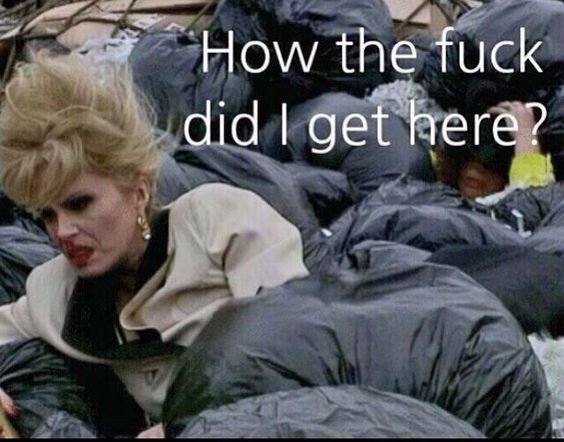
I felt inspired to write my random thoughts and explorations about " free will ", looking into rules of arguing intelligently. It might help some people to listen to all sides more carefully and be cautious with words, to focus on critical judgement and also question why modern men and women misunderstand each other.
There is nothing either good or bad, but thinking makes it so. ~William Shakespeare
My dear friend @limitless reminded me to read this Text by Ngak’chang Rinpoche & Khandro Déchen, HONEY On The Razor’s Edge, The Nature of Gender and Romance ( intuition and logic, chaos and pattern )
Definitely guilty of breaking these rules (sorry!). Will do better in the future ", as my FB friend Ryel said and I have to admit I also broke those rules many times.
The neurologist-philosopher Daniel Dennett's four rules and how to argue well
1. You should attempt to re-express your target’s position so clearly, vividly and fairly that your target says, “Thanks, I wish I’d thought of putting it that way."
2. You should list any points of agreement (especially if they are not matters of general or widespread agreement).
3. Mention anything you have learned from your target.
4. Only then are you permitted to say so much as a word of rebuttal or criticism. Dennett points out this is actually a sound psychological strategy that accomplishes one key thing. It transforms your opponent into a more receptive audience for your criticism or dissent, which in turn helps advance the discussion.
IT'S ALL UP TO YOU TO DECIDE! Is It ?
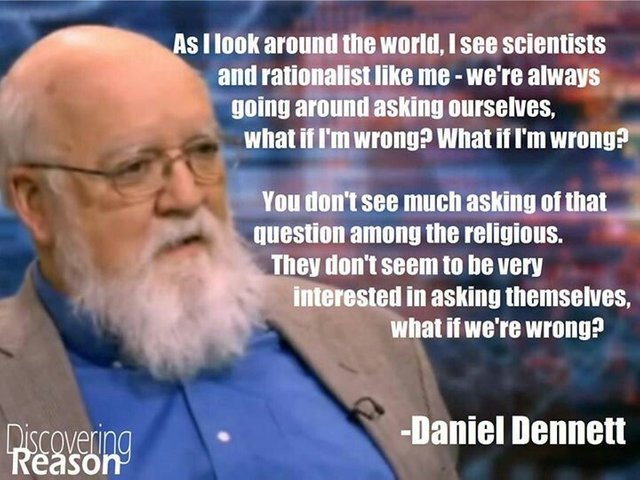
Daniel Dennett Presents 7 Tools For Critical Thinking and I outline just a few quotes.
1. Use Your Mistakes
when you make a mistake, you should learn to take a deep breath, grit your teeth and then examine your own recollections of the mistake as ruthlessly and as dispassionately as you can manage.
2. Respect Your Opponent
your targets will be a receptive audience for your criticism: you have already shown that you understand their positions as well as they do, and have demonstrated good judgment.
3. The “Surely” Klaxon
A “Klaxon” is a loud, electric horn—such as a car horn—an urgent warning. In this point, Dennett asks us to treat the word “surely” as a rhetorical warning sign that an author of an argumentative essay has stated an “ill-examined ‘truism’” without offering sufficient reason or evidence, hoping the reader will quickly agree and move on. While this is not always the case, writes Dennett, such verbiage often signals a weak point in an argument, since these words would not be necessary if the author, and reader, really could be “sure.”
4. Answer Rhetorical Questions
Who’s to say what is right and wrong here?
5. Employ Occam’s Razor
The idea is straightforward: don’t concoct a complicated, extravagant theory if you’ve got a simpler one (containing fewer ingredients, fewer entities) that handles the phenomenon just as well.
6. Don’t Waste Your Time on Rubbish
Dennett’s sixth point expounds “Sturgeon’s law,” which states that roughly “90% of everything is crap.
7. Beware of Deepities
A deepity is a proposition that seems both important and true—and profound—but that achieves this effect by being ambiguous.
The Philosophy of FREE WILL, A Concept of Illusion and Tools for Thinking
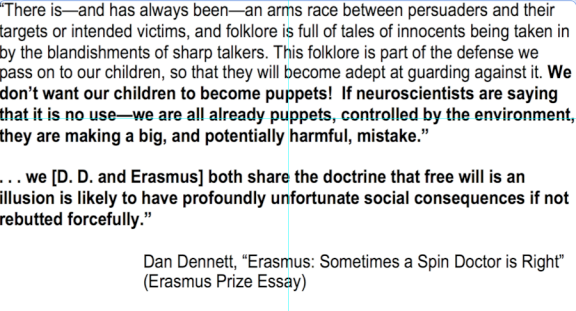
Intuition Pumps And Other Tools for Thinking Hardcover – May 6, 2013
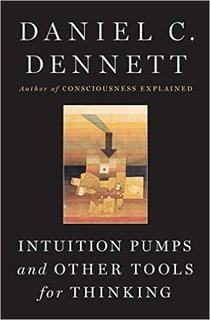
In this episode of the Waking Up podcast, Sam Harris speaks with philosopher Daniel Dennett about free will. Published on 6 July, 2016
Last not least read a very influential book from 1994 and watch this film
Darwin's Dangerous Idea(Documentary)
Read and download the pdf : The Origin of Species
Movie Synopsis:
Charles Darwin’s theory of evolution sent shockwaves through the nineteenth century world, but its impact has continued to be potent and widespread – in society, religion, politics and science. Recounting some of the experiences which shaped Darwin’s thinking during his famous voyage on The Beagle and explaining how the theory broke out from the world of science, Andrew Marr tells of the impact of this revolutionary idea and how it came to challenge so many aspects of society.
A helpful moral to learn from all those observations, when you want to criticise a field, a genre, a discipline, an art form. Do never waste too much of your time and hours hooting at all the crap! Go after the good stuff or leave it alone.
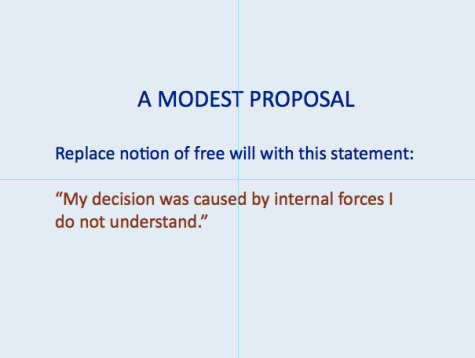
To finish my article I will mention my favourite and inspirational friend I do have wonderful debates and intelligent arguments with, hoping he will not be upset to publish our privat conversation and his valid points.
by @limitless : "Reality is ambiguous and more complex than anyone can know. This is one of the important issues that Buddhism tries to deal with. I look at Trump and I look at the protestor and I can see that both sides genuinely believe that they are doing what's best for humanity, but both sides have inaccurate perceptions of reality. Humans generally have inaccurate perceptions reality, which is why we have so much dialogue, debate, and conflict "
This is another great podcast to listen to.
I don't think any individual can be blamed. The trend has been going this way for the past hundred years.
I think all humans naturally have sense of good and evil, but through focusing too much on the narrative of one side and ego attachment to our own experiences, we lose sight of what important, and that ignorance brings about evil acts.
What I see is a lot of ignorance, hate and fear on both sides of any issue. I'm trying to really detach myself from identifying with any group and just be mindful of behaving according to the right basic principles for myself. That is the best way to keep sanity.
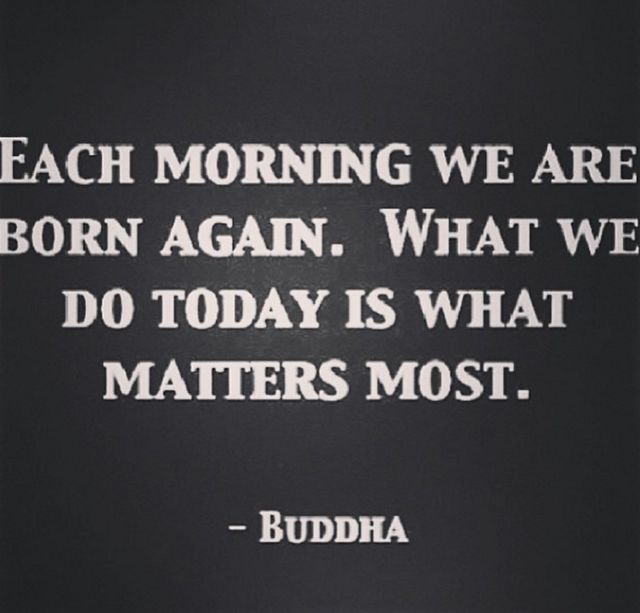
I LOVE THIS :
When your inner critic acts out, silence your mind and say
1. So what? .....So what if you think that? That doesn’t mean it’s true.
2. Who cares? ......You think your judgments means something to me? They don’t!
3. Big deal! ......Oh seriously, big deal! Really, big f’n deal!
4. Why not? ........Why shouldn’t I do this? You’re telling me I can’t? I won’t? I’m not worthy of it? Why not? I’m going to continue doing this anyway, because I can! No matter what you say, I’m going to just keep diving in.
Yours
Mammasitta
Follow on Twitter @silvieinbali
You made a very important point in recognizing that we all break our rules of best practices. Many people know what's the right thing to do and the right way to behave, but we all get caught up in the moment and forget. So that is why we have to constantly remind and re-examine ourselves, and reset our mindsets frequently to recenter ourselves.
This is why I remind myself of this quote frequently:
"No man ever steps in the same river twice, for it's not the same river and he's not the same man." - Heraclitus
Heraclitus is also Terence McKenna's favorite philosopher.
P D OUSPENSKY Strange Life of Ivan Osokin, 1971 Strange Life of Ivan Osokin (3366) by P D Ouspensky
"Ivan Osokin is a disillusioned young man whose self-inflicted failures have left him without prospects and yearning to return to his boyhood so that he may avoid his past mistakes, go to university, and get the girl. A time machine won't help as that would send him back as the man he is now, so instead he invokes a magical smokescreen to return him to his boyhood self but with his adult memories intact. Armed with this foreknowledge he resolves to put things right, but it is not so easy for people to change their ways as this thought-provoking inquiry into determinism versus free will shows."
Thats so romantic! I wish I could do the same, go back and put things right with the knowledge and experience I have now. I am not sure how this could work out though.
I take the advice as below instead.
You might not find it quite as romantic if you read the book, lol.
I am curious enough to find out ! Thank you ....
What a wonderful quote ! I get something to eat now and reply again ....
One of mine as well (Heraclitus)...I based a political analysis model on his concept of "flux" (what I call dynamic equilibrium). "You can never step into the same river twice."
I used to try to step in deep waters, same river more than twice ....always drowning
What he means is that because the water is moving, it's not the same water as you stepped in first, therefore a "different" river.
thinking more about the meaning, I do understand now. Thanks !
I need to better employ Daniel Dennett's rules for how to argue well. Those are really good points to get others to be more empathetic.
He is not always the best in debates himself though :) but you might find his thoughts very accurate in our days.
Thanks for stopping by. I just followed you .
Just came across a quote, apparently by Robert Jones,
"We can disagree and still love each other unless your disagreement is rooted in my oppression and denial of my humanity and right to exist."
I literally just saw this after sending a link to this article along with the quote "Dennett’s sixth point expounds “Sturgeon’s law,” which states that roughly “90% of everything is crap." as both a friend and I were talking about this morning!
I used to be thinking about this so often as I was studying philosophy... Thanks for sharing and hope that more humans will apply the sort of kindness, patience and compassion toward others and themselves when disagreements arise as they will arise one way or another. Your article contains wonderful outlines for a real civilized discourse, dialogue, healthy communication. Thank you so very much as we seem to be at a cross-road in the history of our humanity where such knowing and applying these mode of behaviour can only help us all. So far, our Steemit.com platform seem to be doing a pretty good job in relation to this.
All for one and one for all! Namaste :)
What a thoughtful feedback from you Eric ! I have to let this awesome quote sink in for a second and later tonight I will reply a bit more in detail. You inspired me !
Wow, thank you for the generosity of heart and mind. I look forward to reading your thoughts on it. Have a wonderful day, namaste :)
Great post! So good to see you writing again! :D
so good to see all familiar faces again. I missed you all ! I am trying ....I had such a bad strep-throat, maybe a message and a sign that I should scream or better write again haha
I hope you are feeling better. You and you're writing was missed for sure! :)
I got the addicting bug again :)
It is vital and necessary for everyone !!!
Today more than ever ! Thanks for stopping by !
Excellent post! Very interesting synthesis of multiple important ideas.
Thank you so so so much my dear MUSE :) I hope more steemians will follow your blog !
Cracking post @mammasitta! I'm happy that you're once again in full flow :)
OMG not full flow yet !!
Here you are again ! Cant wait to read some smashing post from you. You are missed !
I always question if I am wrong. I think it just makes life better that way.
Thats good ! Follow your intuition and heart is such simple advice :) Always nice to see your twitter balls here . hahaha
I'm going to add this post to my "How to live my life" diary! Excellent article, awesome @mammasitta! :)
I am so happy to inspire you and so many others with my thoughts running around my mind those past days, watching all those crazy comments on facebook. People are so rude, maybe its me ? I don't know but we all need to learn to be more cautious with our words and behaviours. I still have so much to learn myself. Hugs your way and of course also to @rea
I enjoyed this article very much, being a huge proponent of Sturgeon's Law as well as Occam's Razor. One thing that Dennett touches on is akin to the Rogerian Argument where you always begin with something as complimentary to your opponent (perhaps "Target" isn't the very best choice of words). Upvoted & followed!
Thank you very much and such pleasure meeting new faces. I've been away for a while but fully motivated to "throw out" a few more debates. Target is indeed a very harsh word :) I agree with you but sometimes it feels like we got targets infront of us we do bombard with our thoughts. We wish to "shoot" them in some ways. Oh well , I have learnt to be more calm and enjoyed this topic very much, especially since we all are confronted watching the hateful angry feedback over the election in the USA, many confusing opinions. I had to teach myself to step back, hoping that people need to learn again how to communicate properly, more kindness maybe.
Cicero had a marvelous way to debate "targets"..." I'm so sure of my position I won't even bring up the fact that my learned opponent beats his wife, molests his children, hates kittens and drowns puppies. I don't even need to bring it up."
yeah , I know what you mean .....
Great book by the way : children as targets for adults
on amazon
Cicero was a very skilled, wit and outstanding orator and his speeches the perfect persuasion :)